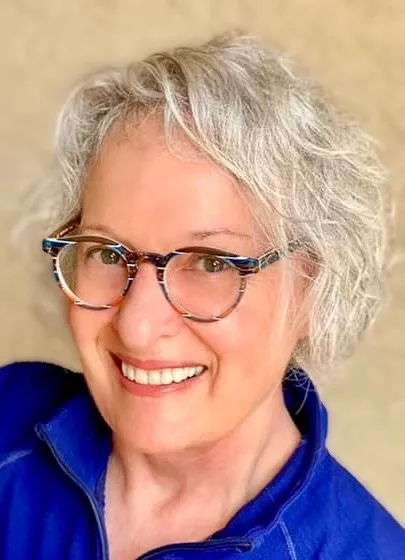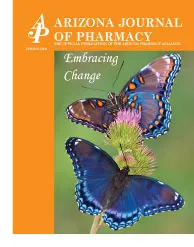Specialty in Neuropsychiatric Disorders and Psychopharmacology
About Martie Fankhauser
Biography
Featured Pharmacist Article
in Arizona Journal of Pharmacy - Spring 2010
Biography
Martha (Martie) P. Fankhauser received a Bachelor of Arts degree in biology in 1972 and a Bachelor of Science degree with distinctions in pharmacy in 1974 from the University of Kansas. In 1982, Ms. Fankhauser completed the Master of Science degree in hospital pharmacy at the University of Arizona and a one-year specialty residency in psychiatry. In 1997, she became a Fellow of the American Society of Health-System Pharmacists (FASHP) and was Board Certified in Psychiatric Pharmacy Practice (BCPP) in 2000 by the Board of Pharmaceutical Specialists.

Ms. Fankhauser was a Clinical Professor in the Department of Pharmacy Practice and Science at The University of Arizona College of Pharmacy from 1982 to 2010 (retired July 2010). She was the program director for the ASHP-accredited specialty residency program in Neuropsychiatric Pharmacy Practice from 1993 to 2004. She trained 12 pharmacy specialists in the residency program and was a preceptor to over 24 Pharm.D. students each year in the psychiatry/ neurology/ pain clerkship program. She was involved in coordinating the Annual Neuropsychiatric Pharmacology Update in Arizona from 1994 to 2005.
Since 2010, she has served as a Pharmacotherapy Specialist for Arizona Smokers' Helpline at the Mel and Enid Zuckerman College of Public Health, University of Arizona. Ms. Fankhauser has served as a Medication Management Specialist at SinfoníaRx - the Assurance Health and Wellness Center. Her interests are in preventative health/wellness interventions, polypharmacy and drug interactions, substance use disorders, tobacco cessation, and nutritional deficiencies.
Ms. Fankhauser has served as the chair for the Specialty Council of Psychiatric Pharmacy Practice (ASHP) and for the Specialty Council of Psychiatric Pharmacy Practice (BPS). She has served as a member of the Regional Programming Task Force, the Recertification Committee, the Professional Affairs Committee, the Program Committee, and a Foundation Board member for the College of Psychiatric and Neurologic Pharmacists (CPNP). She received the Clinical Pharmacy Educator Award at the College of Pharmacy in 1988, 1993, 1997, and 1999 and numerous mentoring awards for the clerkship program. From the Arizona Pharmacy Association, she received the Innovative Pharmacy Practice Award in 1998, the Excellence in Innovation Award in 2015; the Arizona Pharmacist Alliance Exemplary Patient Care Award in 2008 for her work in mental health; and the Pharmacy Appreciation Award in 2011 for significant interest, time, and dedication to supporting the advancement of the profession of pharmacy in Arizona. She received the Arizona Pharmacy Association's Hall of Fame Award in 2021 for her demonstration of innovation or excellence in practice, education, or research. In 2003, she received The Judith J. Saklad Memorial Award from the College of Psychiatric and Neurologic Pharmacists. In 2000, Ms. Fankhauser became board certified as a psychiatric pharmacist (BCPP) through the bpsweb.org/bps-specialties/psychiatric-pharmacy.
Ms. Fankhauser has served as a pharmacy consultant to many agencies, such as the Department of Developmental Disabilities, Arizona Children's Home, CPSA, CODAC, COPE Behavioral Health Services, La Frontera Center, and Reed's Compounding Pharmacy. She has served on the Board of Directors for the Arizona Chapter of the Tourette Syndrome Association and was actively involved in educating professionals on the treatment of Tourette's disorder and associated behaviors. She has served on the Board of Directors, Professional Advisory, and Education Committee for the Autism Society of Southern Arizona.
Ms. Fankhauser is well known in the State of Arizona for her specialty practice in neuropsychiatry and has given numerous talks to healthcare professionals and to the public on psychopharmacology. She helped to develop a Psychiatric Certificate Program through the Arizona Pharmacy Association (AzPA) to help educate pharmacists on the medication therapy management of patients with psychiatric disorders.
Ms. Fankhauser has a private consulting practice in neuropsychiatry and provides guidance and recommendations for individuals who want an assessment of their medications, over-the-counter products, and complementary medicine treatments.
Featured Pharmacist Article in Arizona Journal of Pharmacy – Spring 2010
Psyched about Pharmacy by Kathy Lin, Pharm.D. Candidate, University of Arizona College of Pharmacy, Class of 2010
I thought I might have been crazy when I signed up for two pharmacy rotations in neurology and psychiatry. I knew little to nothing about these fields. Twelve weeks later, I left with a new knowledge base and an everlasting appreciation for neuropsychiatry. During my time at University Physicians Healthcare (UPH) Hospital, I was privileged to work under the direction of Martha (Martie) P. Fankhauser, M.S. Pharm., FASHP, BCPP.

Ms. Fankhauser is a clinical professor in the Department of Pharmacy Practice and Science at the University of Arizona College of Pharmacy. She coordinates six-week rotations for pharmacy students, and in 2009 alone, 40 pharmacy students completed her rotation in neuropsychiatry. Martie has served as faculty advisor to 49 pharmacy students and teaches courses on introduction to mental health, chronic pain management, and clinical pharmacotherapy of mental disorders. From 1995 to 2004, she served as residency director for the ASHP-accredited Neuropsychiatric Specialty Practice Residency Program, which nine pharmacists have completed.
In addition to academia, Martie is a consultant for UPH Hospital, COPE Behavioral Health Services, and La Frontera. In collaboration with the Tucson Police Department and the Pima County Sheriff's Department, she offers her expertise on psychopharmacology in the Crisis Intervention Training Program. Ms. Fankhauser has received numerous awards for her service to patients and education. She was awarded the Clinical Pharmacy Educator Award by the University of Arizona College of Pharmacy in 1988, 1993, 1997, and 1999. In 2008, she was the recipient of the Arizona Pharmacy Alliance Exemplary Patient Care Award. Despite her heavy schedule, Martie was very gracious to set aside time for an interview.
What Sparked Your Interest in Neuropsychiatry?
A friend of mine was the pharmacy director at Mecklenburg Mental Health Center in Charlotte, NC, and he offered me a part-time job. This was the beginning of my career in psychiatry, and I helped to develop a medication education program at the hospital with a psychiatric nurse, Wanda Lancaster. [We] became involved statewide to promote medication education for patients and received a grant for developing a teaching program.
What Led You to Pursue an Academic Position With the University of Arizona?
I came to the University of Arizona to complete an M.S. in Pharmacy and a 1-year specialized residency program in psychiatry from 1980 to 1982. I decided that I needed further training in psychiatry and was fortunate that the University of Arizona received funding from Pima County for a specialized residency in psychiatry. When I finished, there was a faculty position available in the Department of Pharmacy Practice, so I joined the faculty in 1982. I was the first pharmacist in the state of Arizona that had completed a specialized residency program, and the College wanted to have faculty that would teach and mentor pharmacy students.
Education is the Mainstay of Your Profession. In What Ways Have You Served as an Educator to the People Around You?
Since I was a little girl, I have always wanted to be a teacher. I feel that teachers throughout my life made a major impact on me and my career. My jobs have always involved teaching or education, whether to other professionals, patients, or students. I feel I've been blessed to combine my love of pharmacy, psychiatric and neurologic practice, and education for the past 36 years.
What is Your Response to the Notion That Neuropsychiatry is "Too Narrow of a Field" for Pharmacists to Be Involved in?
"Neuropsychiatry" really combines both specialty practices and deals with the study of mental disorders attributable to diseases of the nervous system. Because individuals often have both types of disorders, I want to be able to help any patient who suffers from either psychiatric or neurologic disorders. Although this is a specialty area, the majority of medications prescribed for patients in the U.S. are agents that impact the central nervous system, and these agents can cause significant adverse effects and drug interactions. All pharmacists should understand the pharmacology of psychotropic medications and be able to assess medications for efficacy, drug interactions, and adverse effects.
Out of All the Professions That Exist, Why Pharmacy?
My father, Willis Fankhauser, owned his store, Fankhauser's Pharmacy, in Lyons, Kansas, from 1946 to 1977. I feel that the early influence of my father and working at his store while growing up and during college was a major factor in my love of pharmacy practice.
At UPH Hospital, the Psychiatrists Constantly Request Your Consultation Services. How Did You Develop the Trust and Relationship With the Psychiatrists?
In psychiatry and neurology, pharmacists are often considered important members of the healthcare team and are specialists in drug information. Many of the consultations involve drug selection, dosing, starting/stopping medications, combination therapies, adverse effects, special populations (e.g., elderly and pregnant), and comparison of drugs. Psychiatry is team-based, with many different types of professionals working together for patient care activities.
What Achievements Are You Most Proud of?
Besides having my two wonderful children, I would say that my major achievement was choosing pharmacy for my career. For a later achievement in life, I feel that receiving the 2003 Judith Saklad Memorial Award by the College of Psychiatric and Neurologic Pharmacists was a highlight of my career.
Presently, What Are the Prospects of Pharmacists Finding a Career in Neurology or Psychiatry?
We have a national organization, the College of Psychiatric and Neurologic Pharmacists (CPNP), which is involved with the accreditation of specialty residency programs and also has a job listing service on its website, www.cpnp.org/. The individuals who work in psychiatry or neurology are very involved at all mental health institutions, and the area is growing because these disorders are life-long and require both acute and maintenance therapies.
What Words of Advice Would You Share With Pharmacy Students and Pharmacists?
Keeping up with the literature, both in reading and dissemination of information, is essential if you want to be a respected professional. Pharmacy is a life-long educational process that requires the dedication to always look up information, provide patient counseling, consult with other health professionals, and hold the highest standards for patient safety. Each year when I hear the new graduates take the "Oath of a Pharmacist," I am very touched since these words are a reflection of why we are important in providing healthcare and why we need to be actively involved in improving patient outcomes.
CONSULTATION
New Patient Information and Health Summary
STAY CONNECTED
follow me on
